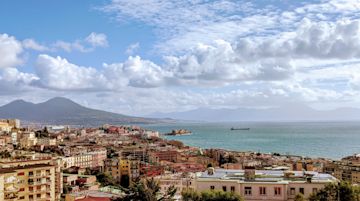
Work Remotely in Spain: A Guide to Getting a Digital Nomad Visa
If you’re dreaming of working remotely from Madrid or Malaga, good news: As of June 2023, non-EU/EEA citizens can apply for Spain's new digital nomad visa. Here's what you need and how to apply.
7 min read
As traditional workplace boundaries have dissolved, even more options have opened up for digital nomads. So, where would your ideal home office be? If your answer is “Spain,” we’ve got good news for you: As of June 2023, the country has approved its digital nomad visa program. This allows freelancers and remote workers from outside the EU to live and work in Spain for up to five years.Sounds good so far? If you’re interested in working remotely from Spain, this guide will walk you through the country’s digital nomad visa requirements and how to apply.Introduced in January 2023 and officially available since June 2023, Spain’s digital nomad visa opens the door for remote workers to experience the country without committing to long-term residency. This visa lets non-EU/EEA remote workers and freelancers live and work in Spain, offering a provisional stay of up to 12 months, which can be extended up to a maximum of five years.If you need tips on how to become self-employed in Spain, check out our in-depth guide.Thanks to the freedom of movement within the European Union, EU citizens don’t need to apply for a digital nomad visa in Spain. But even though it’s relatively uncomplicated to move there, EU citizens still need to be careful when it comes to filing their taxes in Spain. As a remote worker based in Spain, EU citizens are subject to Spanish tax laws, including income tax and social security contributions. If you spend more than 183 days in Spain during a calendar year, you’re considered a resident for tax purposes. The tax rate can be between 14% and 45% of your income, so it’s important to be aware of your tax responsibilities. To get a Spanish digital nomad visa, you need to submit an application at a nearby Spanish embassy or consulate. The appointment scheduling procedure varies based on the embassy in your city, so visit the official website for precise guidelines. The digital nomad visa caters to non-residents who want to live in Spain while working remotely, either self-employed or for an overseas employer. You need to be able to show that the work you do can be done remotely, and you need to work for a company that has been in business for at least one year. If you’re a self-employed freelancer, you should be able to show that you’re well-established and have a steady stream of clients. You can work with Spain-based companies as long as it doesn't make up more than 20% of your overall workload.Other requirements include:Getting your Spanish digital nomad visa is a big decision. Here's a step-by-step guide to the application process to give you a clear overview of how it works. While the cost of living in Spain makes the country attractive for many digital nomads, there are other things you’ll need to plan for, too. Non-residents on a digital nomad visa are subject to a 24% tax rate, applicable up to €600,000 per year during the initial four years of your Spanish stay. Any earnings above this amount are taxed at 48%.Spain maintains double taxation agreements with 90 countries like the United States, United Kingdom, Canada, Australia, New Zealand, and all EU member states. This means that if you’re already taxed on your foreign income in your home country, you’ll be exempt from being taxed again on the same income in Spain.Digital nomads will love Spain's unique blend of work and leisure — midday siesta, anyone? From bustling metropolises to serene coastal towns, here are five of Spain's best digital nomad destinations.Barcelona, the capital of Catalonia, is a modern city overflowing with historic charm. Digital nomads can look forward to co-working spaces with beachfront views, not to mention the iconic Sagrada Familia cathedral, Park Güell, and the delicious fusion of Catalan and Spanish cuisines.Valencia, situated on the Mediterranean coast, has a relaxed yet innovative vibe. The city is more affordable than other Spanish cities, boasting a blossoming tech and start-up ecosystem and futuristic architecture like the City of Arts and Sciences. With comfortable weather year-round, Valencia is a great option for digital nomads who like to spend their free time outdoors.Spain's bustling capital, Madrid, thrives as a business, culture, and creativity hub. With abundant co-working spaces, networking events, seminars, and workshops, you can grow professionally while enjoying historic landmarks and dynamic nightlife. For digital nomads, the city offers an ideal blend of productivity and entertainment.Nestled on the Costa del Sol, Malaga is becoming a hotspot for digital nomads with its Mediterranean charm, growing expat community, and various co-working spaces and meetups. The city's sunny climate and beautiful beaches make it a popular and comfortable place to live and work — who doesn’t want to work remotely from a beachside cafe?Palma de Mallorca, the capital of the Balearic Islands, has picturesque landscapes and a vibrant cultural scene. Cozy co-working spaces and regular networking events offer digital nomads the structure they need to be able to fully enjoy the relaxed island lifestyle.
Looking for an easy way to manage your money from anywhere in the world? As an N26 You or Metal customer, you can withdraw money for free at foreign ATMs worldwide. Plus, you’re covered by an extensive travel insurance package that includes everything from luggage loss, flight delays, pandemic-related cancellations, and more. Find the right plan for you today.
What's the new visa for digital nomads in Spain?
Working remotely in Spain as an EU citizen
How to apply for Spain's digital nomad visa
Spain's digital nomad visa: requirements
- You need to hold a bachelor's or master's degree from a legitimate university, college, or business school, or have at least three years of relevant work experience in your current professional field.
- You need to be financially stable. This should equal 200% of the Spanish national minimum wage (approximately €2,280 per month or €30,840 per year). You need to be able to prove your income with bank statements, payslips, and employment contracts.
- You need to have a clean criminal record.
Spain’s digital nomad visa: the step-by-step application process
- Step 1: Collect all the necessary documents. Some documents will need an Apostille (a stamp that validates and legalizes foreign documents) and/or will have to be translated into Spanish. You can download the official checklist in English here.
- Step 2: Book an appointment at your local embassy and pay the visa fee (usually by bank transfer). The fee varies between different countries but is usually around €80 and it's non-refundable, even if your application is deferred.
- Step 3: Go to your appointment and bring all necessary documentation. Your passport will be temporarily held by the embassy or consulate while they assess your application, and they may also make copies or verify your documents during the appointment.
- Step 4: Pick up your visa! The processing period for your visa application is typically 15 to 45 days. Once approved, you have one month to go get your visa from the embassy or consulate. If your application is declined, they’ll notify you in writing and include the reasons for the rejection. If you want to submit extra documentation and appeal the decision, you have one month to do that.
- Step 5: Get your NIF and NIE. You need an NIE (national identity number) and a NIF (tax number) to open a bank account, for example.
Taxes for digital nomads in Spain
Digital nomad destinations in Spain
Barcelona
Valencia
Madrid
Malaga
Palma de Mallorca
Your digital nomad life with N26
Find similar stories
BY N26Love your bank
Advertising message for promotional purposes. Please see the contractual documentation for more information in the Legal Documents Section.
Related Post
These might also interest youEXPATSMoving to Naples: a comprehensive guide for aspiring expatsWant to move to Naples? Here, get our tips on housing, job opportunities, and how to adapt to the local culture.
15 min read
EXPATSMoving to Turin: a comprehensive guide for aspiring expatsWant to move to Turin? Here, get our tips on housing, job opportunities, and how to adapt to the local culture.
14 min read
EXPATSMoving to Milan: a comprehensive guide for aspiring expatsWant to move to Milan? Here, get our tips on housing, job opportunities, and how to adapt to the local culture.
14 min read




